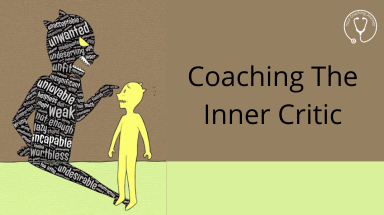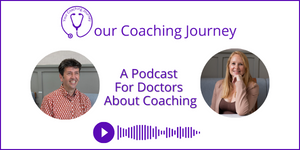Prefer to listen?
This blog post forms the basis of our podcast on introversion in the coaching room which you can listen to here.
What Is The Inner Critic?
Basically, it is that little (or loud) voice inside our head that can be critical.
We know that many people who come into the coaching room have some sort of negative inner dialogue going on in their head, not all the time, but from time to time. And much of the negative thinking that we engage in and where we focus is voiced by that inner critic.
We tend to think our inner critic is just us, and we almost blame ourselves for having the inner critic. But the inner critic is often a voice of someone (or an amalgamation of people) that in the past has been critical of us at some point in time. And if you think about it’s highly unlikely you would be that way with someone else.
We’re probably less likely to be unkind to ourselves when we’re feeling good and resourced and have just eaten a delicious meal. So it may come out more when we’re tired, hungry or a bit overwhelmed or stressed. And of course, we’re more likely to make mistakes when we’re not resourced as well, so that’s prime time for the Inner Critic to make an appearance.
Sometime people that come to the coaching room are very critical of themselves. They’re not even necessarily hearing criticism from other people, but they just have a voice that tells them they’re not good enough or they couldn’t possibly do something or they’re stupid for having done something a certain way.
And they might not say,
- ‘I tell myself this’,
- ‘I feel this’
- ‘I feel not good enough’
- ‘I feel not worthy’
- ‘I’m just hopeless at that’
Sometimes what we hear from our Inner Critic is childhood messaging that we received in some way. Were you ‘the clumsy one’ in your family for example. In reality, you’re probably no clumsier than anyone else, but any time something happens it reinforces the messaging and give your Inner Critic more evidence and ammunition.
It’s important to recognise that it’s perfectly normal to have a dialogue going on in your head and that’s not unusual, we’re all doing it is important. Most of us have some inner dialogue that’s happening for us: when we’re at rest and have time to reflect (or ruminate) on situations or actions, when we think about the future plans we have or ideas that come to mind. If that inner dialogue goes to that place of criticism. For example:
‘well, you can’t do anything because you’re stupid’ or ‘you’re hopeless’. And if the voice that’s critical gets turned up too loud and is there too often, then that can be problematic.
That can impact on our interactions with other people, on how we perceive ourselves, on our behaviours and habits and also can be quite limiting.
It’s particularly problematic if it’s around your own self-esteem and whether you’re worthy of being loved, but it can also exist in smaller areas. It might be a workplace situation where you, in certain scenarios, don’t feel that you’re capable and you’re hopeless at something.
If you’re berating yourself briefly about something that’s happening in the moment, perhaps you tell yourself off for missing a shot at tennis for example, then it’s not really an issue. But if it’s about who you are fundamentally at your core, then you’re thinking, ‘that’s just me and I can’t be fixed’. You might start to feel that you’re broken in some way
How Could You Work With The Inner Critic In The Coaching Room?
One strategy that’s useful to think about is what or who that voice is and to perhaps name that voice and give it an identity. Tom worked with someone who saw or heard that voice as Donald Trump’s voice. And they then had no hesitation in saying, “no, I don’t want to hear from you, shut up. Go away,” because it was Donald Trump’s voice.
Other people have a character that they might identify the inner voice with, as thought they are an actor on their brain that comes out to perform. So you could call them something like, Uptight Tessa, Angry Anna, or Critical Constance. In fact, you might have this whole cast of characters each for different occasions. When you identify them in this way, you can take some perspective, and maybe just recognise that Uptight Tessa’s on stage right now, let’s send her back to the dressing room and let’s invite someone else out who is more helpful to this situation. Just to recap the process would be:
- Identifying the voice.
- Give it a name & an identity
- Ask it to leave.
Nathaniel Branden was an American psychotherapist and writer, involved in self compassion, and he had a philosophy of self-acceptance. He would suggest that when the Inner Critic comes out on stage, we have to invite our inner light to shine and see the greatness in ourself.
Coaching is great for inner critic work because when someone says these things out loud they often sound ridiculous. And a coach can talk someone through it or just allow them the space to say those things out loud and realise that it’s nonsense.
Another method might be to write things down and then go back to read it, just to see what we think about it when it’s out of our head. We might ask, ‘is that really what I think of myself? What nonsense!’
If we have got that inner critic that comes at times when we’re not feeling resourced and we’re stressed and tired it is sometimes difficult to think of the strategy that would be helpful for you to turn that voice down. In fact, many issues that are brought to the coaching room become easier to deal with if we’re well resourced. A good starting point then, and one that Helen uses with her clients, is to work on resourcing yourself as a primary focus; ensuring that you are getting sufficient sleep, nutrition, exercise and so on.
Other strategies for challenging that inner voice
The Inner Mentor
Alongside the inner critic wouldn’t it be great to have an Inner Mentor who might say, hang on a minute, hang on, let’s think about this. Perhaps it’s a fictional character, a personality, or someone who exists in real life who is very calm, reassuring, considered and very compassionate and would talk me through things and allow me to see the other side of things. We could even ask ourselves, ‘What would Bob say in this situation?’ (Bob is Tom’s Inner Mentor.)
Disassociation
This approach comes from Eckhart Tolle who suggests that a good way of eliminating the inner critic is almost like a mindfulness. By stepping outside and recognising that that inner critic dialogue is going on and listening to it as though you’re a third person listening in we can think about what is happening rather than react to it.
It’s thinking about our thinking (metacognition) and as a spectator to those thoughts, you’re not impacted by them in the way that you would be if it was just going on in your head.
Self-Compassion
Whilst it’s important to recognise your mistakes and accept you have ownership of your behaviours, it is necessary to be able to accept who you are and that you’re fallible, you’re human, and you could choose to accept that and forgive yourself and be compassionate. That self-compassion, I think, could be really useful.
Positive Psychology Coaching
In Positive Psychology Interventions coachees are invited to focus things they are grateful for, and using their strengths more and in new ways. Also to focus on moments of enjoyment and connection with other people and having meaning in your life. There’s almost no room for the inner critic there, so this could be a useful coaching approach to use too. You can find out more about positive psychology coaching here.
Your Future Self
Coaching our clients through an exercise where they imagine their future self looking back at their life and at this time, or situation and exploring they would say to themself now.
These are a variety strategies that could be used on Inner Critics and that you could bring to coaching and invite your coachees to engage with, whilst recognising that when someone is in that self-critical place they’re probably not feeling well resourced so it will be very difficult to get out of it. It might be that simple talking to someone else is a really good way to stop the circling of the thoughts, which is one reason coaching is so powerful.
To find out more about our Doctors’ Transformational Coaching Diploma click through here
This blog post forms the basis of our podcast on introversion in the coaching room which you can listen to here.




